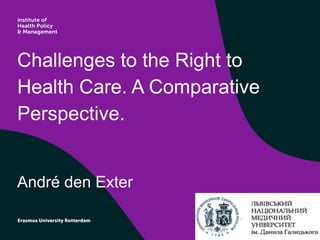Access to health care kiev lecture 2015
- 1. Challenges to the Right to Health Care. A Comparative Perspective. Andr├® den Exter
- 2. Outline ŌĆó Background ŌĆó Meaning of the Right to Health Care in International Law: Recent Developments ŌĆó The Right to Health Care in National law ŌĆó The Justiciability of Health Care Access: Case studies ŌĆó Future Challenges ŌĆó Relevance to the Ukraine?
- 3. Background ’é¦ Economic crisis & Increase health care costs ’é¦ Health care market reforms ’é¦ Rationale ’é¦ Health care access as a recognised human right ’é¦ Litigating healthcare access ’é¦ Rationing ’é¦ Role of the Legislature
- 4. Meaning of the Right to Health Care in International Law: Recent Developments ’é¦ Art. 12 (1) ICESCR ŌĆśhighest attainable standard of physical and mental healthŌĆÖ ’é¦ Art 12(2) ŌĆśSteps to be taken to achieve the full realisation of this right, in particular ....ŌĆÖ ’é¦ General Comment on Health No. 14: - Minimum core obligations - Typology of obligations - AAAQ - Progressive realisation & no retrogressive measures ’é¦ Monitoring health care access and ŌĆśhuman rights indicatorsŌĆÖ
- 5. The Right to Health Care in National law: Global Trends ’é¦ Constitutional / Statutory Right ’é¦ Explicit or implicit recognition ’é¦ Constitutional commitments: - equitable distribution and non-discriminatory access - treaty obligations outlined in international law - irrespective the health care model ’é¦ Monitoring and review system (accountability)
- 6. The Justiciability of Health Care Access: Case studies at the European Human Rights Court Medical asylum seekers ’é¦ D. v. UK, App. no. 30240/96 (St Kitts): Deportation AIDS infected patient subject to inhuman treatment? Prisoners ’é¦ G. v. France, App no. 27244/09: Lack specialized treatment/ psychiatric supervision and inappropriate conditions detention: Inhuman degrading treatment Non-listed treatment methods ’é¦ Panaitescu v Romania, App no 30909/06 (ECtHR, 10 April 2012): denial of life saving medicine; breach right to life ’é¦ Hristozov v. Bulgaria, App no 47039/11 and 358/12 (ECtHR, 13 November 2012: no obligation to regulate access to unauthorised medicines
- 7. The Justiciability of Health Care Access: Rationing by national courts UK: Swindon NHS Primary care Trust (Herceptin litigation) Netherlands: Cost sharing under Health Insurance Act annuled under ILO Convention 102/ECSS provisions (29-5- 1996, 8-9-2006) Poland and Czech R.: Introduction HIS and Co-payments: (restricting benefits); (K 8/96, 275 and K7/95, 414; Pl. US 1/08, 23 September 2008) Austria: Viagra and Human Rights; OGH (10 ObS 12/06x):
- 8. The Justiciability of Health Care Access (2): Tragic cases New medical technologies and limited cost-effectiveness ’é¦ Germany: BVG 6 Dec 2005 (Nikolaus Beschluss): lifesaving (experimental) medicine ŌĆśConstitutional rights & likely positive effect on the course of the diseaseŌĆÖ ’é¦ Switzerland: Fed. Supreme Crt. (Myozyme case), 23 Nov 2010 ŌĆśCost-effectiveness threshold 100.000 CHF QALYŌĆÖ ’é¦ Policy Implications: Transparent criteria & Rationing Procedure
- 9. Future Challenges Rationing and Role Judiciary ’é¦ Innovative approach: Expanding definition human rights & measuring StatesŌĆÖ progressive realisation ’é¦ CourtŌĆÖs referral to and applying Oviedo Convention, art. 3 ’é¦ Role of the EU Court Justice and EU Human Rights Charter ’é¦ Democratic debate on Rationing decision-making and moral dilemmas ’é¦ Importance of professional guidelines/protocols, adressing both clinical and cost-effectiveness & human rights arguments ’é¦ Fair rationing
- 11. References A. den Exter, Health care Law-making in CEE. Review of a Legal- Theoretical Model, Maklu Press (2002) A. den Exter and M. Buijsen (eds.), Rationing Health Care. Hard choices and unavoidable trade-offs, Maklu Press (2010) A. den Exter (ed). Compendium of European Health Law, Maklu Press (2016) /www.bmg.eur.nl/english/research/eu_projects/jean_monnet_programme / Contact: denexter@bmg.eur.nl











